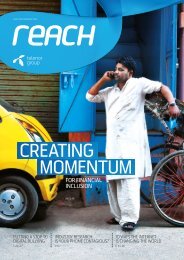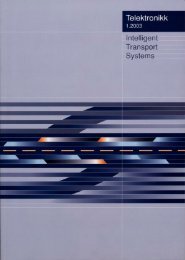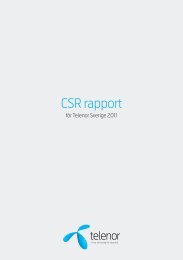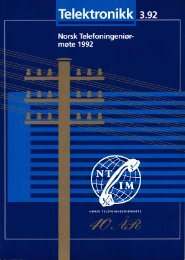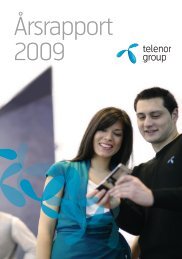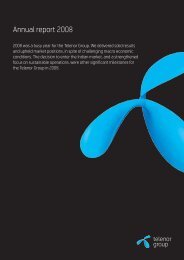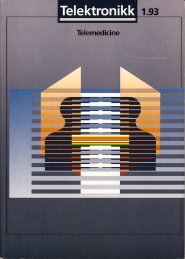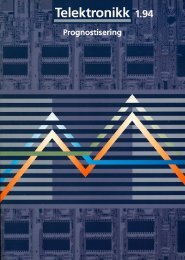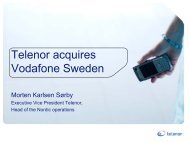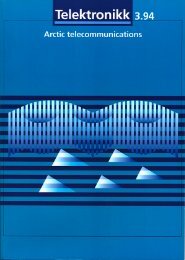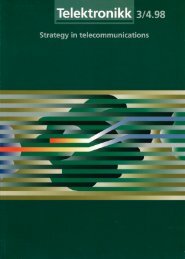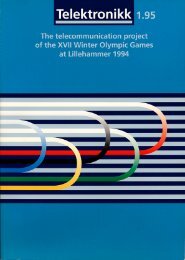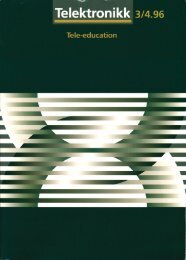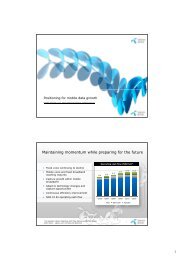Create successful ePaper yourself
Turn your PDF publications into a flip-book with our unique Google optimized e-Paper software.
Arve Meisinset (52) is Senior<br />
Research Scientist at <strong>Telenor</strong><br />
R&D. He is currently working on<br />
information systems planning,<br />
and has previously been engaged<br />
in Case-tool development<br />
and formal aspects of humancomputer<br />
interfaces. He has<br />
been involved in several network<br />
management projects, and has a<br />
particular interest in languages<br />
for data definitions and mathematical<br />
philosophy. He is ITU-T<br />
SG10 Vice Chairman, Working<br />
Party Chairman for WP3/10 Distributed<br />
Object Technologies,<br />
and the <strong>Telenor</strong> ITU-T technical<br />
co-ordinator.<br />
arve.meisingset@telenor.com<br />
144<br />
Standardisation Policy<br />
ARVE MEISINGSET<br />
ITU is a specialised agency of the UN. Having participated for some years at all levels of<br />
ITU-T, in addition to some participation in other bodies, I will summarize some of the main<br />
questions and conflicts in global standardisation – as I see them.<br />
The members of a global standardisation organisation,<br />
like ITU-T, will necessarily have different<br />
roles, different backgrounds and different<br />
interests, which make it difficult to establish<br />
effective consensus views. For example, West<br />
European telecommunication operators have<br />
experienced a liberalisation where they are no<br />
more restricted to operate within national borders,<br />
and they can act independently of the state,<br />
while they experience a strong competition in<br />
their original national markets. The situation is<br />
similar in the USA, but the state seems to exhibit<br />
a stronger role at the regional level, as seen in<br />
the divestiture of AT&T and the lawsuit against<br />
Microsoft. Similar regulation of business is<br />
attempted in Europe; however, here each EU<br />
member state is an ITU Member State, while in<br />
USA the entire union of states only is a Member<br />
State.<br />
While the developed countries in the past have<br />
used high prices on international connections<br />
to subsidise the development of their national<br />
infrastructure, they are now ready to compete all<br />
over the world. Less developed countries have<br />
not had the opportunity to build their infrastructure<br />
and adjust to a deregulated market before<br />
the competition starts. Hence, we see different<br />
attitudes to policy questions between developed<br />
countries, to developing countries, between<br />
operators, between vendors and between the various<br />
types of ITU members, i.e. Member States<br />
or Sector Members (telecommunication operators,<br />
industry and others). Example issues where<br />
these conflicts come to the surface are cost sharing<br />
for international telephone traffic, cost sharing<br />
of Internet traffic, call back, satellite terminals,<br />
and the role of State Members versus Sector<br />
Members.<br />
The standardisation sector of ITU has in the past<br />
served as an interest organisation of traditional<br />
telecommunication operators. Agreed ITU-T<br />
Recommendations have proved to be a powerful<br />
means to force vendors to deliver products<br />
according to the operators’ wish. With the developer,<br />
i.e. vendor, participation, this has often<br />
proved to be an effective way of bringing forward<br />
interoperable products from different ven-<br />
dors. However, new telecommunication operators<br />
have not always given participation in<br />
ITU-T a high priority.<br />
As the computing technology has been introduced<br />
to implement communication services,<br />
there has been a need to co-ordinate standardisation<br />
work in the various global standardisation<br />
organisations, like ITU-T, ISO and IEC. Use of<br />
so-called common texts, has resulted in standards<br />
being carried between these bodies and<br />
rubber-stamped by them. This is not a very efficient<br />
way of co-ordination.<br />
Regional standardisation organisations have<br />
tried to work faster and more flexible than the<br />
global standardisation organisations, and in<br />
many cases they have succeeded. National standardisation<br />
organisations have most often not<br />
been that ambitious, but have seen their role as<br />
co-ordinating and expressing their national interests<br />
in the regional and global organisations, and<br />
to promote the international standards at the<br />
national level, including translation.<br />
However, in some cases the regional standardisation<br />
organisations have global aspirations, as<br />
expressed in the ETSI <strong>Future</strong> Role. ETSI had a<br />
success story with GSM, and is trying to copy<br />
the success for UMTS. This is done by establishing<br />
the 3GPP outside ETSI, with participation<br />
from other regional standardisation bodies, while<br />
the results are adopted as ETSI Deliverables and<br />
by the other bodies, as well. This way, 3GPP<br />
acts as a global standardisation body in the<br />
mobility domain and rivals the current international<br />
standardisation organisations, such as<br />
ITU-T. It is this conflict that comes to the surface<br />
with the establishment of the ITU-T Special<br />
Study Group for IMT-2000 and beyond. The<br />
Europeans do not want it, as they are happy with<br />
UMTS as the global standard, while others want<br />
interoperation between several regional standards.<br />
This is also a question of where work<br />
should be done and where we should send the<br />
experts. 3GPP is an asset to the ETSI aspirations,<br />
while being a challenge to ETSI’s current<br />
role by moving the most important work item<br />
outside of ETSI.<br />
Telektronikk 1.2001



